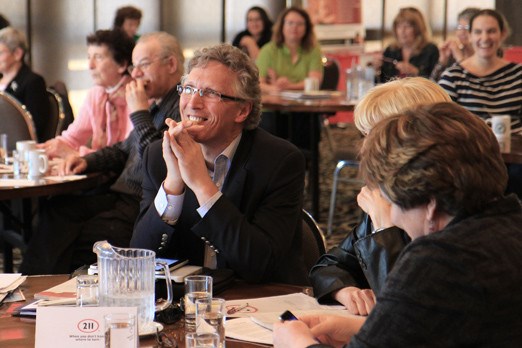Like an illness, it’s always better to figure out ways to prevent poverty than to pay for its consequences, Mark Chamberlain says.
The Hamilton businessman should know. For nearly a decade, Chamberlain has been spearheading the Hamilton Roundtable for poverty Reduction. More and more research has shown that social determinants of poverty cost society a lot more when they show up in emergency rooms or prison systems than dealing with the roots of the problem.
Chamberlain said preventing those issues up front should be seen as an investment rather than a cost.
“We can either afford today the preventative side, providing adequate income, adequate nutrition, adequate housing, adequate education , adequate investment into our early years or we can pay for it when it shows up as costs to healthcare or illness care with the greater use of emergency wards, poorer health and possibly even more use of the justice system,” Chamberlain said in Thunder Bay Wednesday as part of the Lakehead Social Planning Council annual general meeting.
The way to start addressing those needs is collaboration. The Hamilton roundtable has everyone involved from business leaders to various social agencies discussing poverty reduction to have a louder voice on the issue but also to figure out ways to better use the resources available to help fight it.
Because the issues cross a broad spectrum of funding from all levels of government, it can be difficult to convince people that prevention is the way to go. But Chamberlain said the first step is starting the discussion.
“It doesn’t matter what you do or how you do it you will always have critics,” he said. “When groups like this come together to fill a void of collaboration the first thing that you may be criticized for is not what you’re doing but what you’re not doing. A group like this here cannot solve poverty on its own.”
And solutions won’t come immediately. Chamberlain said it has to be viewed long-term. Only now is Hamilton able to start seeing actual data on how poverty reduction is helping.
“What we don’t know exactly is how much that will completely impact the community. What we do know anecdotally is if we don’t do it we won’t solve it and we’ll continue with these large costs,” he said.
Coun. Paul Pugh said he’s just glad Thunder Bay is really starting to work together to find solutions to poverty reduction. With an estimated 15 per cent of the population living below the poverty line, he said that number is disturbing.
“I don’t think there’s any quibbling over the fact that we have a serious problem,” Pugh said. “People in the 21st century in a country as rich as Canada shouldn’t be living in those conditions.”
The LSPC is starting to develop a four-year plan on poverty reduction. Executive director Marie Klassen said she wants the council to start talking to the community about the issue.
“We’re going to engage with the community and talk to and dialogue with our folks here in Thunder Bay,” she said.
